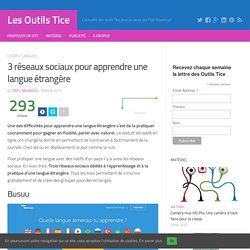

3 réseaux sociaux pour apprendre une langue étrangère. Une des difficultés pour apprendre une langue étrangère c’est de la pratiquer couramment pour gagner en fluidité, parler avec naturel.

Le web et les outils en ligne ont changé la donne en permettant de s’entrainer à tout moment de la journée, chez soi ou en déplacement, le jour comme la nuit. Pour pratiquer une langue avec des natifs d’un pays il y a aussi les réseaux sociaux. En voici trois. Trois réseaux sociaux dédiés à l’apprentissage et à la pratique d’une langue étrangère. Tous les trois permettent de s’inscrire gratuitement et de créer des groupes pour des échanges. Busuu C’est une des plus importantes ressources en ligne pour apprendre une langue étrangère. LiveMocha Livemocha annonce 16 millions d’utilisateurs pour un réseau social qui permet de contacter des personnes parlant 35 langues étrangères différentes.
50+ Common British Phrases to Impress your British Mates. It’s widely known, if not common knowledge, that American and British English vary.

Not only in spelling, but in some of their terms, phrases, colloquialisms, and of course, pronunciation. It’s completely possible that you walk into a British bar and don’t understand more than half of what they are saying. If you don’t want to be this person and you want to be able to converse fluently with your British mates, then we’re here to help you out! The Differences Between American and British English As mentioned before, British terms, British phrases, British expressions as well as spelling differ by American phrases and expressions, but what else is there? It’s also fun to learn just how different British sayings are. Vocabulary – While the two may share the majority of words in the English language, there are also some differences. 50+ British Phrases and their Meanings Have you ever been the odd one out in a group of British mates not getting the joke?
25 Words That Are Their Own Opposites. Here’s an ambiguous sentence for you: “Because of the agency’s oversight, the corporation’s behavior was sanctioned.”

Does that mean, "Because the agency oversaw the company’s behavior, they imposed a penalty for some transgression," or does it mean, "Because the agency was inattentive, they overlooked the misbehavior and gave it their approval by default"? We’ve stumbled into the looking-glass world of contronyms—words that are their own antonyms. 1. Sanction (via French, from Latin sanctio(n-), from sancire ‘ratify,’) can mean "give official permission or approval for (an action)" or conversely, "impose a penalty on. " 2. 3. 4. 5. 6. Artificial intelligence - A new AI language model generates poetry and prose.
The SEC said, “Musk,/your tweets are a blight.

/They really could cost you your job,/if you don’t stop/all this tweetingat night.” /…Then Musk cried, “Why? /The tweets I wrote are not mean,/I don’t use all-caps/and I’m sure that my tweets are clean.” /“But your tweets can move markets/and that’s why we’re sore. /You may be a genius/and a billionaire,/but that doesn’t give you the right to be a bore!” THE PRECEDING lines—describing Tesla and SpaceX founder Elon Musk’s run-ins with the Securities and Exchange Commission, an American financial regulator—are not the product of some aspiring 21st-century Dr Seuss.
The software is built on the idea of a “language model”. Actually building such a language model, though, is a big job. The more text to which an algorithm can be exposed, and the more complex you can make the algorithm, the better it performs. The results can be impressive. Given that OpenAI wants eventually to sell GPT-3, these results are promising. Speech to Text. Phrases to make you fall in love with Swahili. Swahili is widely spoken across the African continent, but primarily in East Africa.

The origin of Swahili is rooted in Arabic and dates several years back. It became known as the Swahili we know now after Arab and Persian traders landed on the East African coast between 500 to 1000 AD. In Arabic, the word Swahili means “the coast” or “coastal people”. The meaning then transcended to be a part of the East African coastal culture and in Swahili, the right way to describe the language is Kiswahili, the people who speak it as their native language refer to themselves as Waswahilis. The Swahili language is of Bantu origin and has borrowed words from other dialects like Arabic, English, German, Portuguese. Although Kiswahili was initially associated with the slave trade since buyers from Arabian Peninsula and Persian Gulf used it to facilitate their trade in the hinterland of East Africa, it is now considered the lingua franca of the East African region.
Literary. Contextua. Texty. Earthbound Places. Enculturation. As It Appears. FOOD Facts. GraspAbility. Keeper of the Flame. Quotable. *minds matter* Write for Life. Everyday. Reading. Language and the Human Experience. Langage corporel. Language teaching. Compréhension de l'oral.